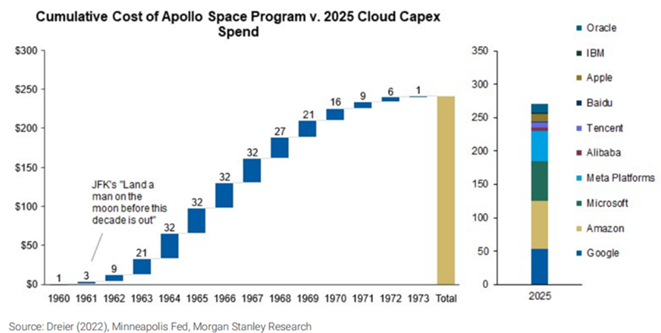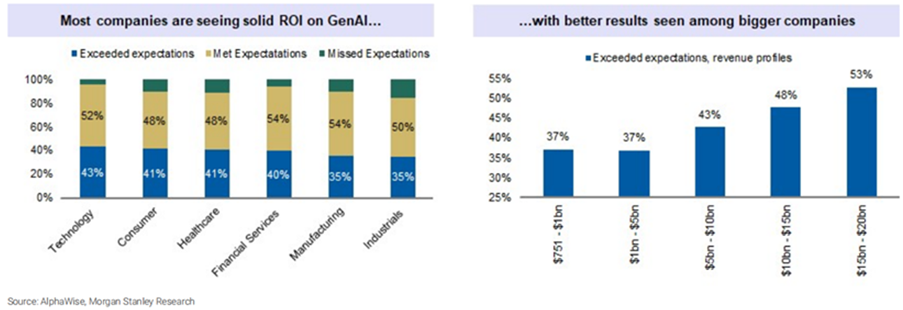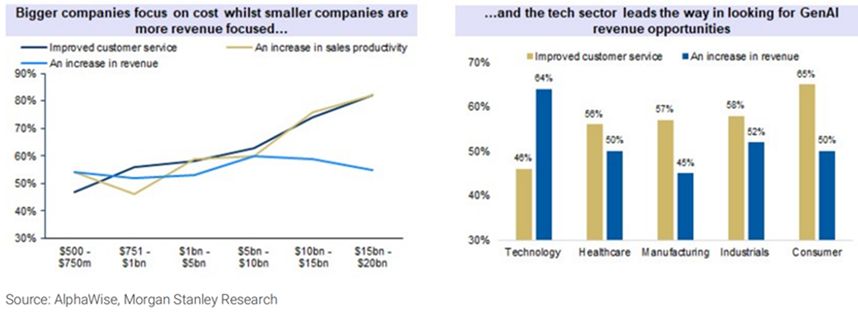AI Is Already Monetizing, Just in Another Way
According to a latest report released by Morgan Stanley, global corporate capital expenditure in the AI infrastructure is expected to reach an astonishing level by 2025, nearly equivalent to the total cost of the historic Apollo space program, which consumed about $257 billion from 1960 to 1973 (adjusted for current prices).
This inevitably raises the question: Is such a hefty investment in technology truly worthwhile? Can AI deliver value comparable to that of the moon landing?
Morgan Stanley further indicated that despite huge investments in generative AI, the technology is gradually showing its effectiveness in practical applications. It has been helping companies optimize production processes, enhance customer service efficiency, and achieve cost savings across various sectors.
▶ Companies are beginning to see returns of AI capex
Morgan Stanley's AlphaWise survey, which covered 400 large companies across six different industries globally, demonstrated the significant effects of generative AI in practical applications.
The data reveals that most companies using generative AI have achieved or exceeded their expected return on investment, with about 50% of the projects meeting expectations and another 40% exceeding expectations.
Although generative AI projects have a high initial investment threshold, once implemented, the benefits are significant. The phenomenon is more obvious in larger companies. Among companies with revenues less than $1 billion, 37% reported a return on investment better than expected; for companies with revenues over $15 billion, the likelihood of generative AI projects exceeding expectations was 15 percentage points higher.
Notably, large enterprises with annual revenues exceeding $15 billion are more focused on using generative AI to reduce costs; the technology and industrial sectors are more focused on using generative AI to increase revenue. Smaller companies seek to comprehensively use generative AI—increasing revenue while reducing costs.
▶ How do enterprises utilize generative AI?
Generative AI helps enterprises reduce costs and increase productivity in various forms.
Morgan Stanley's report points out that customer service is one of the most extensively applied areas of generative AI. All six industries surveyed reported that generative AI performed exceptionally in customer service. Particularly in large enterprises, generative AI can significantly reduce the time spent on manual operations and improve overall work efficiency.
For example, in the cosmetics industry, L'Oréal uses generative AI to assist customers with skin analysis and product recommendations, significantly speeding up the product selection process and increasing the sales conversion rate from 10% to over 70%.
In addition to customer services, some retailers use AI for inventory management and improving data efficiency.
For instance, the report mentions that global retail giant Walmart has updated its vast product catalog with generative AI technology, making the process 100 times faster than traditional manual operations.
▶ Most enterprises view data security as the biggest obstacle
Although the prospects for generative AI seem bright, Morgan Stanley also points out that companies still face many challenges when widely adopting this technology.
The survey shows that about 60% of companies consider data security as their primary concern, while 25% worry about the reputational risks that may arise from deploying AI tools too rapidly.
Still, Morgan Stanley states that despite these challenges, the long-term potential of generative AI cannot be ignored. Especially against the backdrop of a shrinking labor force, generative AI is expected to become a key technology in addressing productivity and labor shortages. In the longer term, the report predicts that it will gradually transform from a tool for reducing costs to a core driver of enhancing corporate competitiveness.
Disclaimer: Moomoo Technologies Inc. is providing this content for information and educational use only.
Read more 29
29 3
3




10baggerbamm : I would sincerely hope that the value is greater than the moon landing. after all what do we get from the moon landing conspiracy theories that we never went there and several Hollywood movies over the years
101775147 AL alfijai : Can we play forex?
牡蠣ぐにゅ : I'd like to see AI automatically explore the universe.